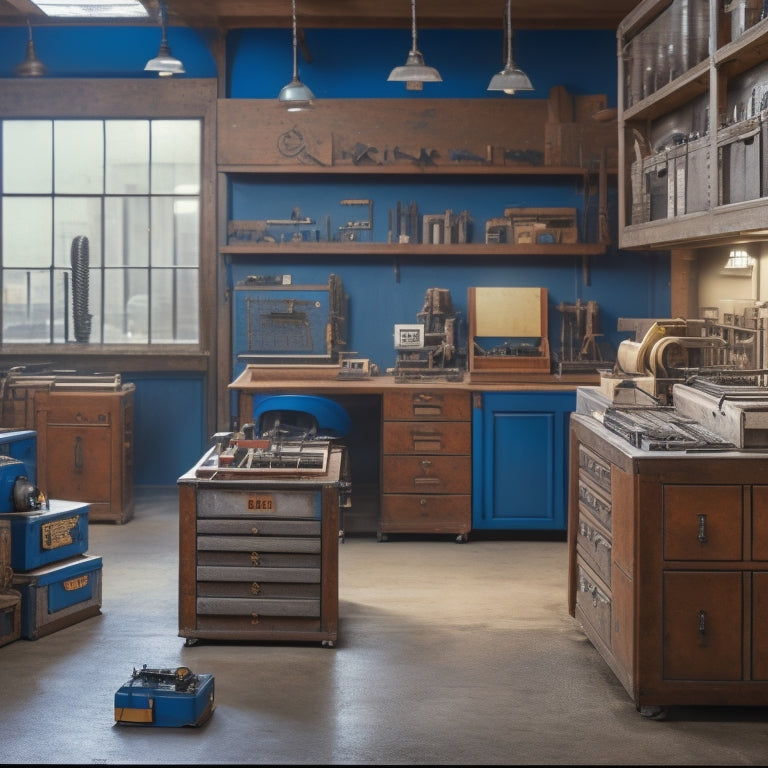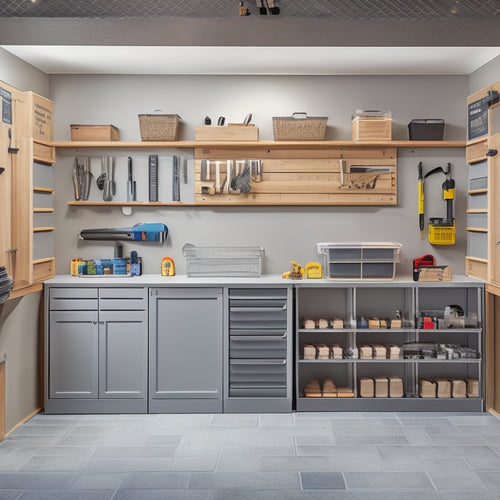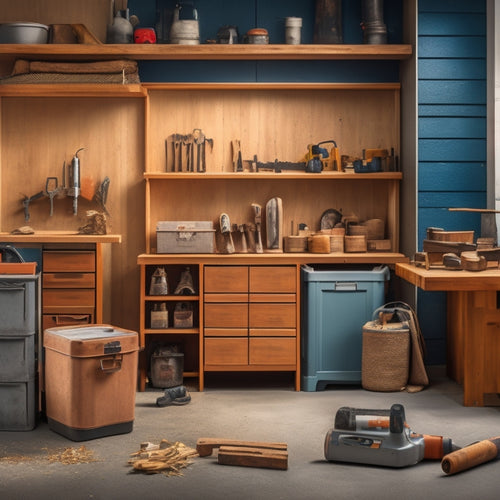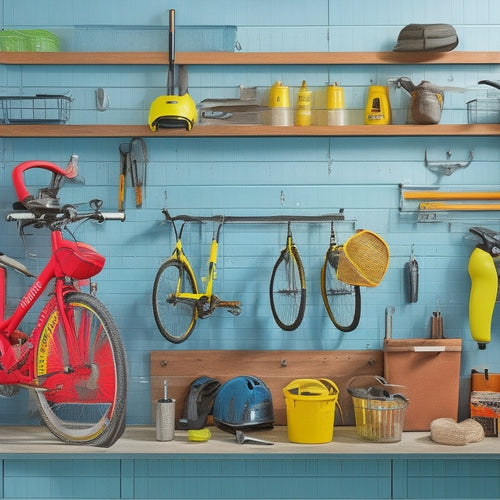
Top Machinist Toolboxes for Maximum Productivity
Share
When it comes to maximizing productivity as a machinist, you need a toolbox that's up to the task. Top brands like DeWalt, Milwaukee, and Stanley offer durable, organized, and mobile solutions to keep your essential tools within reach. Consider a toolbox that balances size, storage capacity, and customization options to fit your unique workflow. A well-organized toolbox with labeling systems, categorization, and ergonomic handles can considerably reduce downtime and enhance efficiency. By selecting the right toolbox for your needs, you'll be well on your way to streamlining your machining operations - and that's just the starting point for optimizing your productivity.
Key Takeaways
- Top-rated toolbox brands like DeWalt, Milwaukee, and Stanley offer durability, organization, and mobility for maximum productivity.
- Essential tools like measuring tools, safety equipment, and cutting tools should be stocked in the toolbox for efficient machining operations.
- Toolbox size and storage capacity impact portability and accessibility, with larger toolboxes offering more storage but being heavier.
- Durability and build quality are crucial, with features like heavy-gauge steel, impact resistance, and protection from damage and accidents.
- Organizational systems like labeling, categorization, and drawer dividers help machinists quickly access tools, reducing downtime and increasing productivity.
Top-Rated Machinist Toolbox Brands
When selecting a machinist toolbox, the brand can greatly impact your productivity and workflow. You need a reliable brand that provides a durable and organized storage solution for your tools.
Top brands like DeWalt, Milwaukee, and Stanley offer high-quality toolboxes that meet the demands of machinists. These brands have established themselves through user reviews and ratings, showcasing their commitment to providing exceptional products.
DeWalt's toolboxes, for instance, are known for their heavy-duty construction and innovative features like removable trays and adjustable dividers. Milwaukee's toolboxes, on the other hand, boast a rugged design and advanced organizational systems.
Stanley's toolboxes are renowned for their durability and versatility, making them a popular choice among machinists.
When choosing a brand, consider factors like durability, organization, and mobility. Read user reviews to get a sense of how well a particular brand's toolbox performs in real-world scenarios.
Essential Tools for Machinists
You've invested in a high-quality machinist toolbox from a top-rated brand, now it's time to stock it with the right tools for the job. As a machinist, you know that having the essential tools at your fingertips is vital for maximizing productivity and ensuring machining safety.
Start by including essential measuring tools like calipers, micrometers, and depth gauges. These tools enable you to accurately measure and inspect parts, ensuring precise fits and tolerances.
Next, add machining safety equipment like safety glasses, earplugs, and a first-aid kit to protect yourself from potential hazards.
Don't forget to include a set of precision cutting tools, such as drill bits, end mills, and lathe tools, which are fundamental for machining operations. Additionally, consider adding a tool sharpening kit to keep your cutting tools in prime condition.
Toolbox Size and Storage Options
A machinist's toolbox is more than just a container for tools - it's a workstation that requires careful evaluation of size and storage options to maximize efficiency.
When choosing a toolbox, you'll want to contemplate the dimensions and storage capacity to guarantee it can hold all your essential tools.
Toolbox dimensions are crucial, as they impact portability and accessibility. A larger toolbox may provide more storage but may be heavier and less portable. Conversely, a smaller toolbox may be more portable but may not hold all your tools. You should reflect on the size of your workspace and the tools you need to store when selecting the ideal toolbox dimensions.
Storage capacity is also essential, as it directly affects your productivity. A toolbox with ample storage capacity will keep your tools organized, reducing the time spent searching for them.
Look for a toolbox with adjustable compartments, dividers, and trays to customize your storage space. By choosing a toolbox with the right size and storage options, you'll be able to work efficiently and safely, minimizing downtime and increasing your overall productivity.
Durability and Build Quality Matters
The durability and build quality of a machinist's toolbox are essential factors in guaranteeing it withstands the rigors of daily use and maintains its functionality over time. You need a toolbox that can withstand harsh environments, heavy tools, and frequent transportation.
When evaluating a toolbox, consider the material selection, as it directly affects the toolbox's durability. Look for toolboxes made from heavy-gauge steel, aluminum, or high-impact plastics that can resist corrosion and wear. Impact resistance is also vital, as it determines how well the toolbox can absorb shocks and drops. A durable toolbox will protect your prized tools from damage and guarantee they remain organized and within reach.
Moreover, a well-built toolbox will reduce the risk of accidents and injuries caused by faulty or broken toolboxes. You'll also appreciate the reduced maintenance and replacement costs that come with a high-quality toolbox.
Organizational Systems for Efficiency
Having a durable and well-built toolbox is only half the battle; it's equally important to have a toolbox that's intelligently organized to maximize your productivity. You need a system that allows you to find the right tool quickly and easily, reducing downtime and increasing efficiency.
Labeling systems are essential for identifying what's stored in each drawer or compartment. You can use color-coded labels or stickers to categorize tools by type, size, or frequency of use. This way, you can locate the tool you need at a glance, even in a crowded toolbox.
Drawer dividers are another vital component of an efficient organizational system. By separating tools into smaller groups, you can prevent clutter and mess, making it easier to find what you need.
You can also use dividers to store small parts and accessories, keeping them organized and within reach.
Customization Options for Machinists
Toolbox customization is essential for machinists who require specific layouts to accommodate their unique workflows. You need a toolbox that mirrors your work style, allowing you to access tools quickly and efficiently.
Customization options enable you to create a personalized space that suits your needs. Consider the toolbox aesthetics, as a well-designed layout can improve your productivity and reduce eye strain. You can also incorporate personal branding elements, such as logo engraving or color schemes, to give your toolbox a professional touch.
When customizing your toolbox, think about the frequency of tool use and prioritize accordingly. You may want to allocate more space to frequently used tools or organize them by category.
Some toolboxes offer modular compartments, adjustable dividers, or removable trays to facilitate customization. Take advantage of these features to create a workflow-centric layout that streamlines your work process.
Mobility and Portability Features
You need a machinist toolbox that's easy to move around the shop floor, so consider the weight and size of the toolbox, as well as the handle and grip design, which should fit comfortably in your hand.
A well-designed handle can make all the difference when you're constantly transporting your tools.
Additionally, look for toolboxes with wheels and casters options to further enhance their mobility and portability.
Toolbox Weight and Size
Three essential considerations for machinists on-the-go are weight, size, and mobility of their toolboxes. You need a toolbox that's easy to transport without compromising on storage capacity.
Toolbox weight is a significant factor, especially if you're working on multiple projects simultaneously. A heavy toolbox can lead to fatigue, reducing your productivity.
Look for toolboxes with a weight that's evenly distributed, allowing you to lift and carry them comfortably. Typically, a toolbox should weigh between 20-40 pounds, depending on the size and material.
The toolbox dimensions are also vital in determining its portability. A compact toolbox with a smaller footprint is ideal for tight spaces, while a larger one may be more suitable for storing bulkier tools.
Measure your workspace and consider the tools you need to store to determine the best toolbox size. A well-designed toolbox should balance weight, size, and storage capacity to guarantee maximum mobility and productivity.
Handle and Grip Design
Lift and carry your toolbox with confidence, thanks to a well-designed handle and grip system. A well-thought-out handle and grip design guarantees you can transport your machinist toolbox safely and efficiently.
Look for ergonomic handles that fit comfortably in your hand, reducing fatigue and strain. Textured grips provide a secure hold, even with gloved hands or in wet conditions. This feature is critical when working in environments where oil or water may be present.
A good handle and grip design also enable you to maintain control of the toolbox when maneuvering stairs, tight spaces, or uneven terrain. Additionally, consider the handle's height and positioning; a handle that's too low or too high can cause discomfort and affect your balance.
Wheels and Casters Option
When transporting your machinist toolbox, a well-designed handle and grip system is just the beginning.
Equally important are the wheels and casters that allow you to effortlessly move your toolbox around the workshop or job site. You'll want to take into account the type of caster that best suits your needs. Do you need a soft-wheel caster for smooth floors or a hard-wheel caster for rough surfaces? Perhaps a combination caster that can handle both?
The wheel material is also vital, as it affects durability and resistance to wear and tear. Look for wheels made from high-quality materials like polyurethane or nylon, which can withstand heavy loads and harsh environments.
Additionally, take into account the swivel radius and overall maneuverability of the caster system to guarantee easy maneuvering around obstacles.
Budget-Friendly Toolbox Solutions
Frequently, machinists on a tight budget find themselves sacrificing quality for affordability when it comes to toolboxes. However, you don't have to compromise on quality to remain within your budget. There are affordable options available that offer cost-effective features without sacrificing performance or safety.
Look for toolboxes with durable construction, such as steel or aluminum frames, and rust-resistant coatings. Consider toolboxes with removable trays and dividers to help you stay organized and efficient. You can also find toolboxes with built-in locks and latches to guarantee your tools are secure.
Additionally, consider toolboxes with adjustable shelves and compartments to accommodate tools of various sizes. Some budget-friendly toolboxes also come with features like oil-resistant mats and drainage systems to prevent damage from spills and leaks.
Innovative Toolbox Designs
You'll appreciate innovative toolbox designs that prioritize compact storage solutions, allowing you to optimize your workspace and reduce clutter.
Modular tool organization systems, for instance, enable you to customize your toolbox's layout to suit your specific needs.
Compact Storage Solutions
With precious workshop real estate at a premium, machinists are turning to innovative toolbox designs that maximize storage capacity while minimizing footprint. You're likely no exception, and that's why compact storage solutions are a must-have in your toolbox.
You can achieve this by incorporating stackable storage systems that allow you to store more tools in a smaller area. This not only saves space but also keeps your tools organized and within easy reach.
When selecting a toolbox with stackable storage, look for ones with reinforced frames and secure latches to guarantee your tools remain safe and secure.
Another key feature to take into account is drawer dividers. These enable you to categorize and separate your tools, making it easier to find what you need quickly.
Drawer dividers also prevent tools from getting jumbled or damaged, reducing the risk of accidents and injuries.
Modular Tool Organization
By embracing modular tool organization, you can take your toolbox to the next level, streamlining your workflow and enhancing productivity. This innovative approach to toolbox design allows you to customize your storage space with flexible configurations, ensuring that your tools are always within easy reach.
Modular storage solutions provide a high degree of adaptability, enabling you to reconfigure your toolbox as your needs change. This flexibility is particularly significant in fast-paced machining environments, where tools and equipment are frequently updated or replaced.
| Modular Component | Description | Benefits |
|---|---|---|
| Stackable Trays | Interlocking trays for customized storage | Maximizes vertical storage space, reduces clutter |
| Adjustable Dividers | Customizable compartmentalization | Organizes tools by type or frequency of use |
| Removable Inserts | Interchangeable tool holders | Adapts to changing toolsets, reduces tool loss |
| Pivot Bins | Rotating storage bins for corner spaces | Optimizes corner storage, improves accessibility |
| Base Plates | Reinforced foundation for modular components | Enhances stability, prevents damage to tools |
Frequently Asked Questions
Can I Add My Own Custom Label to the Toolbox Drawers?
You can definitely customize your toolbox by adding your own labels to the drawers, which is a great way to implement custom labeling options and enhance your drawer organization tips for a more efficient and safe workspace.
Are There Any Toolboxes Specifically Designed for CNC Machinists?
As you step into the machining arena, imagine a harmony of precision - you'll find toolboxes customized for CNC machinists, boasting features like precision tool storage, organized compartments, and ergonomic designs, ensuring your focus remains on crafting masterpieces, not searching for misplaced tools.
Do Machinist Toolboxes Come With a Lifetime Warranty?
When you invest in a high-quality machinist toolbox, you'll often find it comes with a lifetime warranty, ensuring you're protected against defects and guaranteeing exceptional toolbox durability, so you can focus on precision work without worrying about warranty coverage.
Can I Install a Lock to Secure My Toolbox?
You can enhance toolbox security by installing a lock, guaranteeing your precious tools are protected from unauthorized access. Prior to lock installation, verify the toolbox's material and design accommodate the lock type, and follow the manufacturer's guidelines for a secure fit.
Are There Any Eco-Friendly Machinist Toolbox Options Available?
You're looking for eco-friendly machinist toolbox options, and yes, they do exist! Many manufacturers now incorporate sustainable materials and portable designs, ensuring reduced environmental impact without compromising functionality or safety.
Conclusion
You've got the blueprint for the ultimate machinist toolbox. Now, it's time to build your productivity powerhouse. With the right combination of essential tools, clever storage, and durable design, your new toolbox will be a well-oiled machine, humming along like a precision-crafted engine. By investing in a high-quality toolbox, you'll be able to tackle projects with confidence, speed, and accuracy, making you the expert of your machining domain.
Related Posts
-

Essential Steps for Garage Storage System Design
You're about to change your cluttered garage into an organized haven by following a structured approach to garage sto...
-

Tool Storage Chests for a More Organized Workspace
You're looking to enhance productivity and reduce stress in your workspace by getting your tools organized, and that'...
-

Benefits of Pegboard Racks in Your Garage
By installing a pegboard rack in your garage, you'll reveal a wealth of benefits that change your workspace into a hi...


